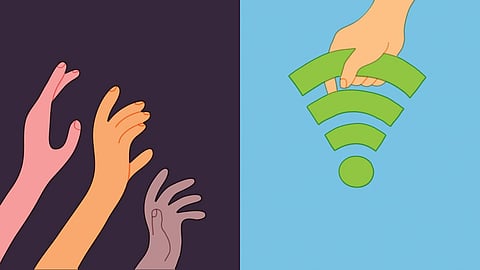

The All India Students’ Association invited several teachers, students and student leaders to further the conversation on online classes and the digital divide that it has created among various sections of society. The Delhi University Teachers’ Association has been campaigning against the University’s decision to hold Open Book Exams and online classes. After the High Court turned down their petition, the DUTA wrote to Principals of the DU colleges to refrain from holding the exams. The DUTA has, however, continued to speak up on the digital divide and the impact of holding the exams especially on SC,ST and OBC students.
Sathish Deshpande, a member of the DUTA said that he is unable to understand why the government took so long to even decide on the course of action, when the solution was so plain and simple. “It is the easiest decision to take in a situation like this. There is a reason why an UG course was divided into six semesters, it was to lessen the burden on students. So if a student misses a final exam or a semester exam, what happens? The average of the previous semesters is taken. Now, what is the difference? Did the sky fall down? So I can’t understand how a decision that is so simple to take was debated for so long and when the authorities did finally come out with a decision, they went in the opposite direction entirely. They’ve not given a single reason as to why they think this exam needs to be conducted,” he said.
Calling the decision an invitation for commercial enterprises to flourish, Deshpande said that no one is against online classes, “Both teachers and students are learning and fighting it out but we are not at a stage that we can say this is only our future or claim that we are ready to adapt to it. There’s nothing wrong in online classes but we are not in a stage where we can hold exams. Only commercial enterprises are going to benefit from this, this is not just happening in India but throughout the world, this is an opportunity for them to make money,” he believes.
Nandita Narain, another member of DUTA said she fully agreed with Deshpande, “A professor from AMU who wrote to the VC criticising online exams was issued a show-cause notice for doing so. This is our job, it is our job to highlight the shortcomings of online education and bring to the forefront the fact that students don’t have uniform access.” She pointed out that even teachers are struggling to access online classes because many have gone back to their hometowns. “Many teachers themselves are not trained in holding open book exams. We don’t have experience or expertise. And by handing over the responsibility of setting the paper and evaluation to someone else, we lose out on the credibility of the process. Companies are saying 'Give us the money and we will solve the problem for you', but who can guarantee that cheating won’t take place? When students are under such tremendous stress and we have seen suicides already for the same reasons, what is the need to hold classes or exams? When they can cancel school board exams, why not college semester exams?” she asks.
“It really makes one wonder, where the college authorities are facing so much pressure from? That they feel so compelled to hold these exams. I will confess, I, myself, have no idea how to conduct these exams,” N Sukumar, a DU professor said. The professor is also in-charge of handing SC, ST student issues for the Political Science Department and has been urging the HOD to take cognisance of the fact that minority students would be the worst affected by the decision. “Not a single statutory meeting has been held so far to discuss the issue. Students are the centre of education, without students, Universities will have to shut down. So how can we not take their problems into consideration?” he questioned.
“I’m ashamed that the authorities are not bothered about SC, ST and OBC students. They can't even afford data, forget laptops or smartphones. I come from a Dalit background, I know what my house looked like. Most students will be living in one room houses and their entire family will occupy that one room, how can you expect them to give an exam in their environment? When I raised this issue people said, why are you doing activism. But these are our students, why are we not standing by them? Where are their humanistic values?” the professor asked. He also pointed out the Muslim students who had suffered in the North East Delhi violence and questioned how they would be able to access resources?
“This is a very reasonable demand. This is not activism,” he stated.
Another differently-abled student from Delhi University also pointed out how students without scribes will be unable to attempt any exams, “Also we've left our audio books and other resources back on campus. Our universities itself are not disabled- friendly, so how can we even say online exams are?” Female students on the panel also pointed how many female students will face discrimination in their own homes and won’t be able to access the internet, “A lot of women will be asked to do household chores and won’t be allowed access. If there is a male and female student in the house, then who will be given preference? These are all factors that must be taken into consideration,” a member of Pinjra Tod said.
Another student, hailing from remote village said that he was only able to attend this webinar because he was in Delhi, “If I was in my village I would have had to sit on my roof to get network, or I’ll have to walk all over the village trying to get even one or two bars on my phone. In this situation, how do they expect that we can write exams?”
